1000xResist review - a deeply personal exploration of diaspora politics and psychology
Sister act.
Making sense of diaspora politics, regardless of culture and country involved, is a singularly painful dance with no fixed steps and no finale. It is a landscape littered with well-intentioned armchair warriors, white people, privileged expats, weird nationalists, and foetid trolls; everyone disagrees almost all of the time, with some blessed exceptions that bring people around the world together to ridicule a clown. Diaspora discourse might involve the fraying borders of a motherland or a monoculture, authenticity, racism, accents and code-switching, and dozens of other things that remain wholly untranslatable to an outside party. The psychology at play is a weird chimaera that can never be accurately captured in codified language of research and focus groups; the very idea of applying "accuracy" and objectivity to its study is a joke. It is also not the same repeated anecdote about white kids making fun of a stinky homemade lunch at school – friends, let's move past this as the core signifier of marginalised childhood. But it is always a mess, because the diaspora is chaotic by nature and necessity.
Sunset Visitor's speculative fiction adventure 1000xResist knows the fractal intensity of this mess well – so well that the game does an almost sociopathic job at mirroring the exhaustive cycles and repetition that define this world. At times it gets a little too solipsistic – understandable, given that the main premise is about clones facing the burden of existence – and at times I have to walk away because I'm just so damn tired. But it's also an extraordinary piece of work – one that places diasporic trauma front and centre in all its ugly glory.
This is a story that traces the echoes of Hong Kong's Umbrella Revolution, which left a city-sized wound that hasn't yet closed or been allowed to scar with dignity. And as much as certain audiences might want to frame 1000xResist as a neat one-dimensional exploration of queerness, there is so, so much more to it than that. There is nothing especially unique about its structure or core concept – the difficult process of a character finding the man behind the curtain – and I certainly would not describe it as "the first game of its kind." What makes it so jarring and so open to these claims is the fact that it is simply not a game made for the white gaze, and I think that's beautiful.
The player (mostly) sees the world through the eyes of Watcher, one of five clones made from the ALLMOTHER. As someone who grew up watching Captain Planet every Saturday morning, it is very hard not to automatically identify Watcher as Ma-Ti, the youngest and most vulnerable of the Planeteers who mostly served as emo comic relief until the proverbial hit the fan. If you are old enough, you'll remember that Ma-Ti deserved better, because the show did him dirty at every available opportunity. We meet Watcher just as she plunges a knife straight through the ALLMOTHER's chest – she has inexplicably killed her god, her sun, her reason for living.
What ensues is a fragmented scramble through the ALLMOTHER's memories from her past life as a teenager named Iris. She's coming to terms with a strange immunity to an even stranger disease; at the same time, the world is facing the arrival of weird inscrutable aliens in the vein of Ted Chiang's short story Story of Your Life (later adapted into Arrival). It's a pretty straightforward combination of exploration, visual novel-style scenes and dialogue, and occasional "zip" platforming sequences when Watcher enters the ALLMOTHER's memories during Communions, which have a simple time-manipulation mechanic to change the environment.
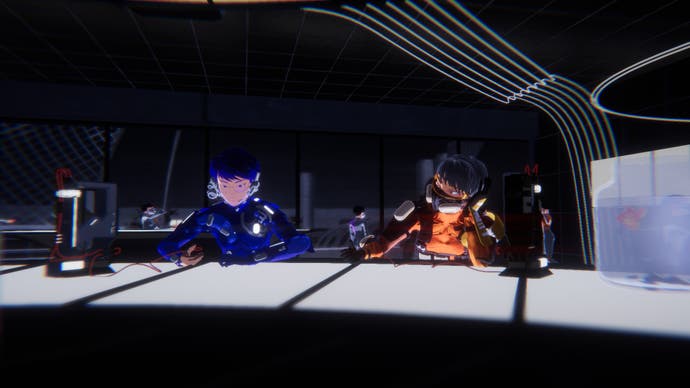

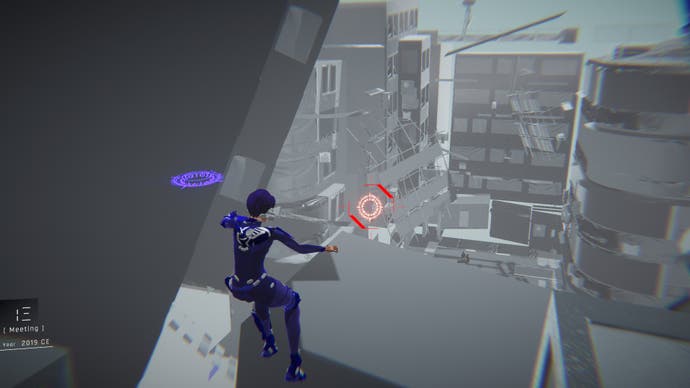
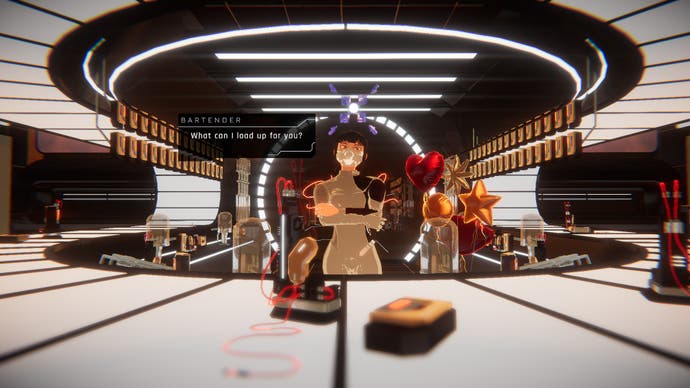
At the outset, the game uses the high school setting, a place full of angst and raw teen feelings, to lay the groundwork for the bigger picture. It's simple, but highly effective. Iris, the ALLMOTHER-in-waiting, whatever you want to call her, isn't just unlikeable, she's a stone cold bitch. There's a thin layer of schadenfreude in seeing Watcher learn this first-hand – a slow, chilling dawn that sheds bleak new light on something or someone you previously thought infallible. We've all been there, and it's rough. The complications here are distinctly diasporic – Iris is the sole friend of Jiao, a recent Chinese arrival who latches onto her with a naive fervour. This particular narrative thread of 1000xResist isn't Single White Female: Immigrant Story, but a thoroughly too-real exploration of cultural hegemony and its dissemination when kids are at their most volatile and vulnerable. Jiao is learning to fit in through the most straightforward mimicry, and naturally there's a lot to find frustrating and embarrassing here, but Iris's mother wants her daughter to do the right thing and take this awkward new girl under her wing. That Iris is cruel and dismissive isn't a surprise – this sort of dynamic is never going to go smoothly, not at this age, and most certainly not in this setting.
The invisible effects of immigration and eventual assimilation (always an intended outcome, whether you like it or not) are ugly and gruelling. It requires extraordinary long-term endurance from both body and mind. There is a constant interior tension about performance and normalcy and acceptance, because failure risks a physical expulsion from the corpus. We learn to see this in Jiao, at first – too earnest and too naive to be around someone like Iris – in the hormonal panopticon of high school. What 1000xResist does exceptionally well here is to reproduce individual-level anxiety, and reframe and reamplify it on every level of the game's narrative as Watcher's journey spirals beyond a small contained setting into a devastating global spectacle.
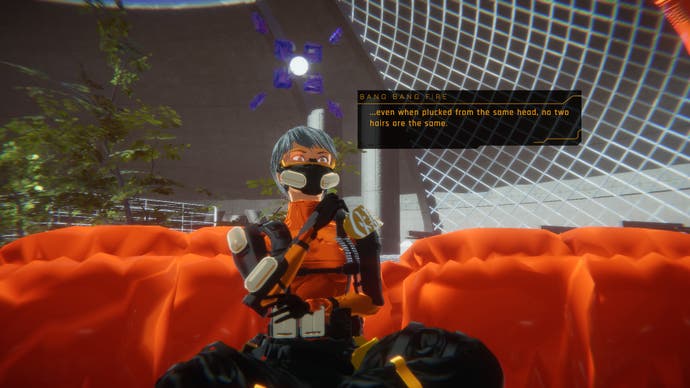
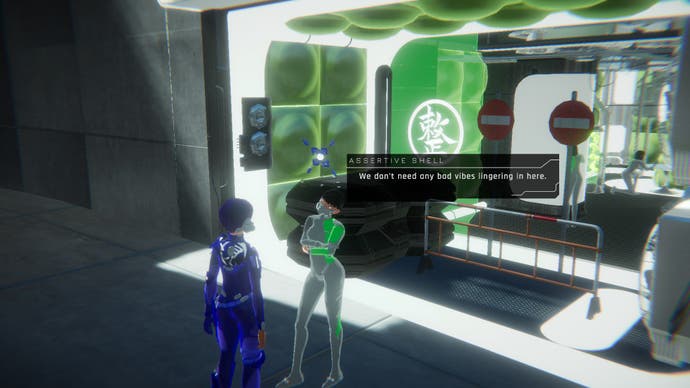

There is nothing clearly analogous here about the game's message that could be slotted nearly into a CliffsNotes summary; it's not a simple diagrammatic exercise where you can draw facile, moralistic parallels between the perceived spectre of China and whatever is going on in the ALLMOTHER's childhood fortress of solitude, or how her parents met during the revolution. Watcher, at times, is willfully obtuse to the reality of her heritage ,purposefully evasive about choices and clarity. Sunset Visitor is unravelling a very specific source of trauma – the democratic uprising in Hong Kong – and telling a necessarily messy story about its legacy. All of this is framed as an act of witnessing, particularly for Watcher, who has a literal god-given role as an observer and empathiser with the ALLMOTHER.
The most resounding triumph of 1000xRESIST, at least for me, didn't become clear until the last third of the game; at this point it's clear that Watcher has uncovered a ratking of lies about the ALLMOTHER's stories. There is some delightful banter among the sister-clones and their shells (the lesser-tiered, subservient clones) that showcases the many facets of Iris's spawn – each, in some ways, a small crystallised node of what Iris could have been. But it's also where the repetition started wearing on me, particularly the cryptic phrases during Watcher's "communions" – the sharing and exploration of the ALLMOTHER's memories – with her sisters. Most of all, I was starting to hit a wall with the coded dialogue between Watcher and an alien Occupant – abstruse phrases steeped in symbolism and metaphor. This is when I realised that what I was experiencing was essentially an homage to one of Star Trek's most beloved stories.

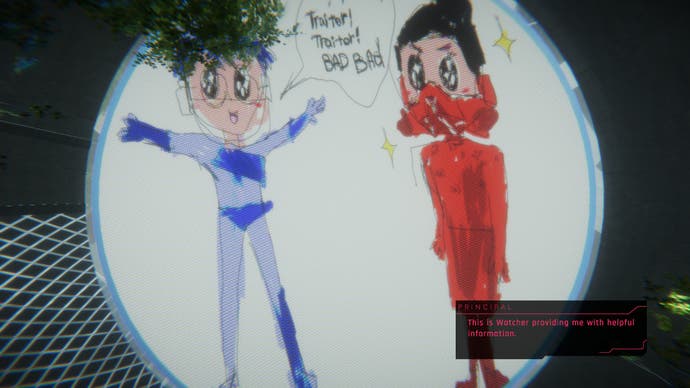

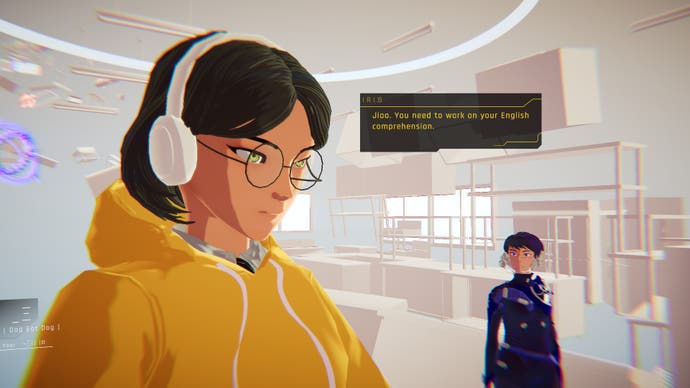
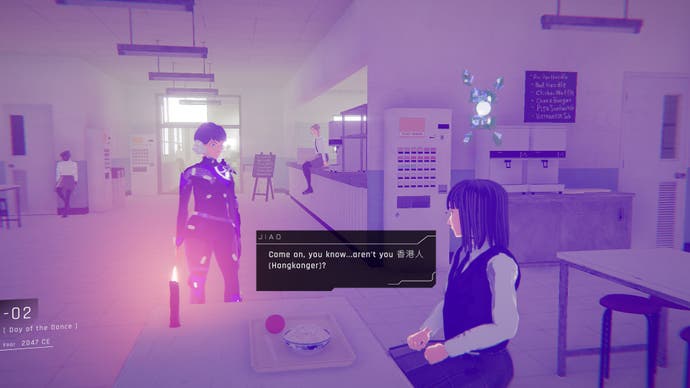
Darmok is a Star Trek: The Next Generation episode that involves the Enterprise crew learning to communicate with aliens whose language is structured around metaphors drawn from their own history and mythology. What 1000xResist has done is to borrow elements of this iconic narrative and adapt it to the mythology of the ALLMOTHER, and on a higher level, the framework of a student-led resistance movement that was so thoroughly repressed, censored, and brutalised (the protest anthem, Glory to Hong Kong, was just criminalised a few days ago) that it developed its own coded slang – a highly contextual and specific vocabulary – to ensure its story survived.

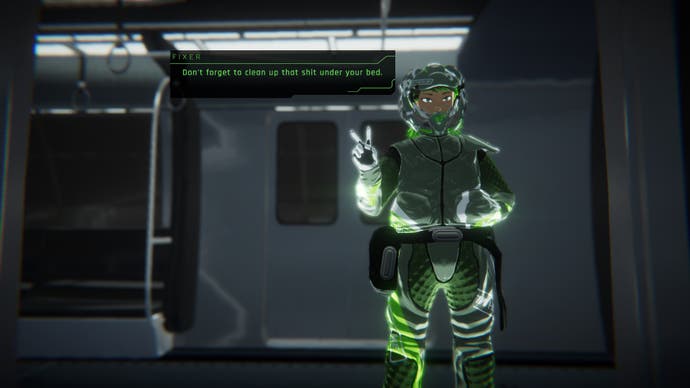
After this is all over, I feel an uneasy sense of pseudo-catharsis – not so much satisfaction, but the relief that I am no longer responsible for Watcher and these incredibly complicated things out of my control . If there is nothing inherently likeable or easy to accept about Iris, there is nothing easy about how the game winds up. 1000xResist leans right into the fractured reality of governance and tells you to make choices that can't possibly serve everyone, but, like Iris, albeit with a smidge less psychopathy, you can choose what serves you. After all, she survived, where everyone else didn't; her presence and the ambient shape of her legacy looms large over those that remain. Perhaps "serenity now" wasn't the intended outcome of the game, but a wave of acceptance washes over me as I choose an ending that I can live with.
It feels especially meaningful that I write this review during the process of travelling – an act of moving, reorienting, learning, and witnessing. It is meaningful to witness this game and its message – to resist, always, I mean, it's right there in the name – during a time of unprecedented student uprisings against Palestinian genocide. When I finally begin to write, I glance at my notes, which consist of a single sentence: What if the centre of the world, whatever that thing might be that we orbit and orient ourselves around, was a huge c**t? I relay this question to my friend, who takes less than a second to respond. "Isn't it already?"
A copy of 1000xResist was provided for review by Fellow Traveller.


